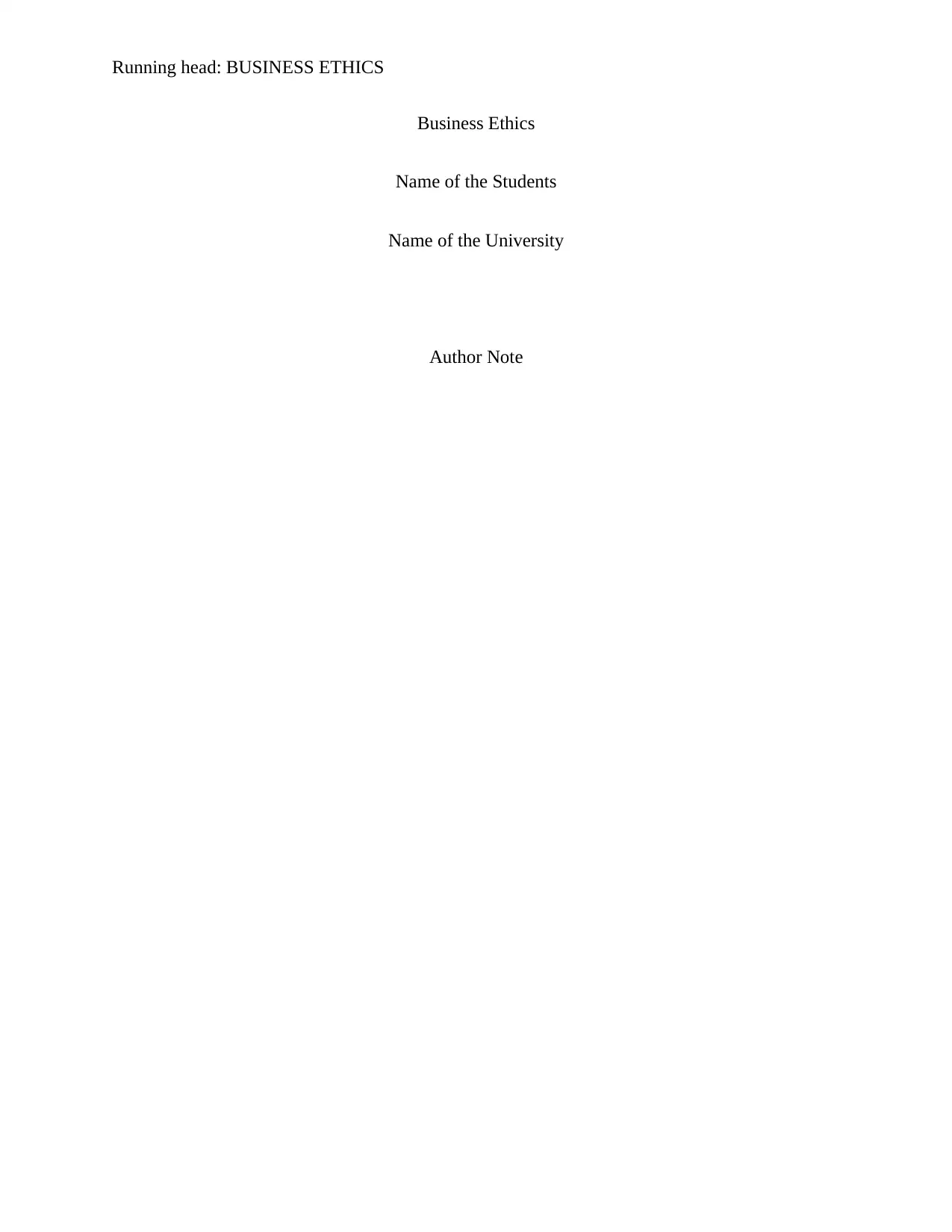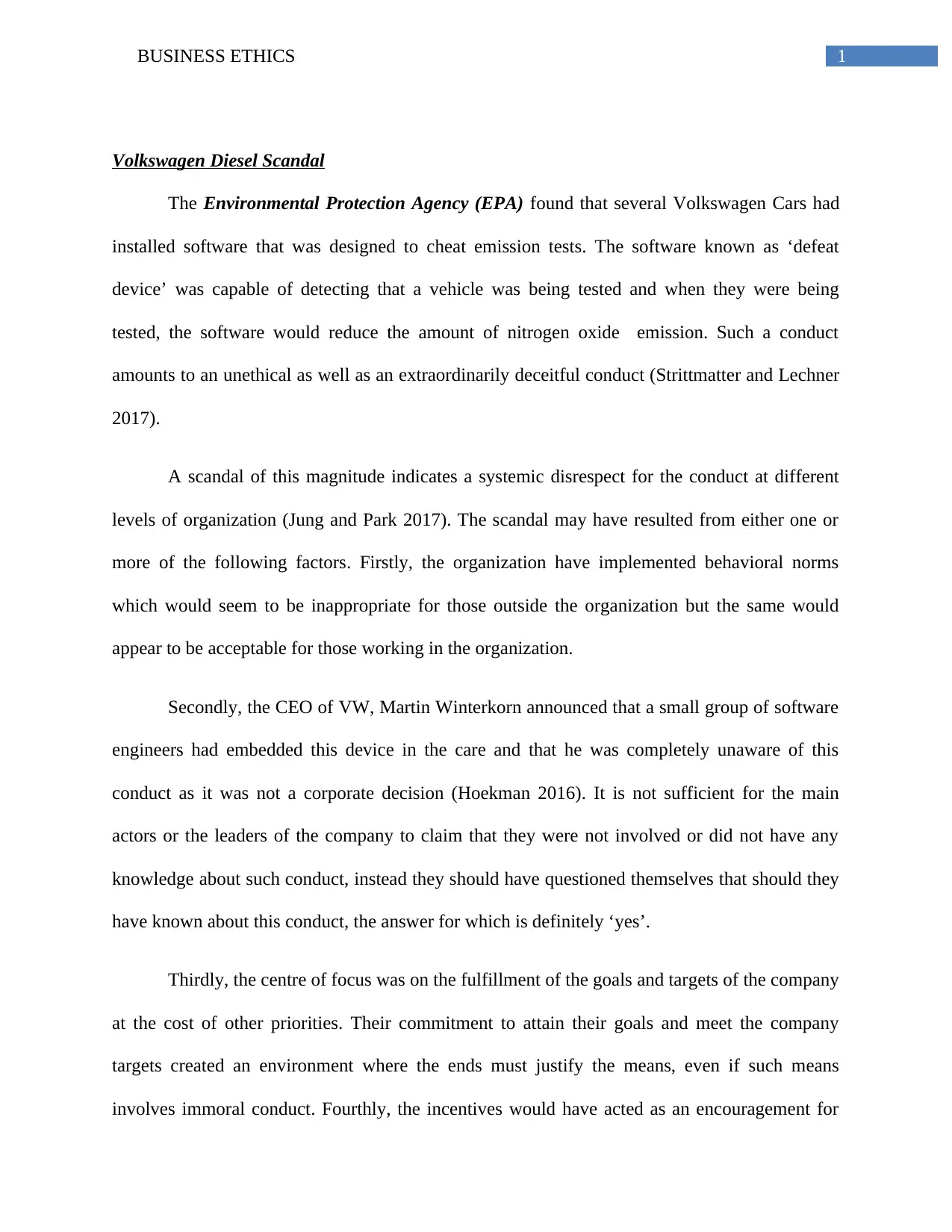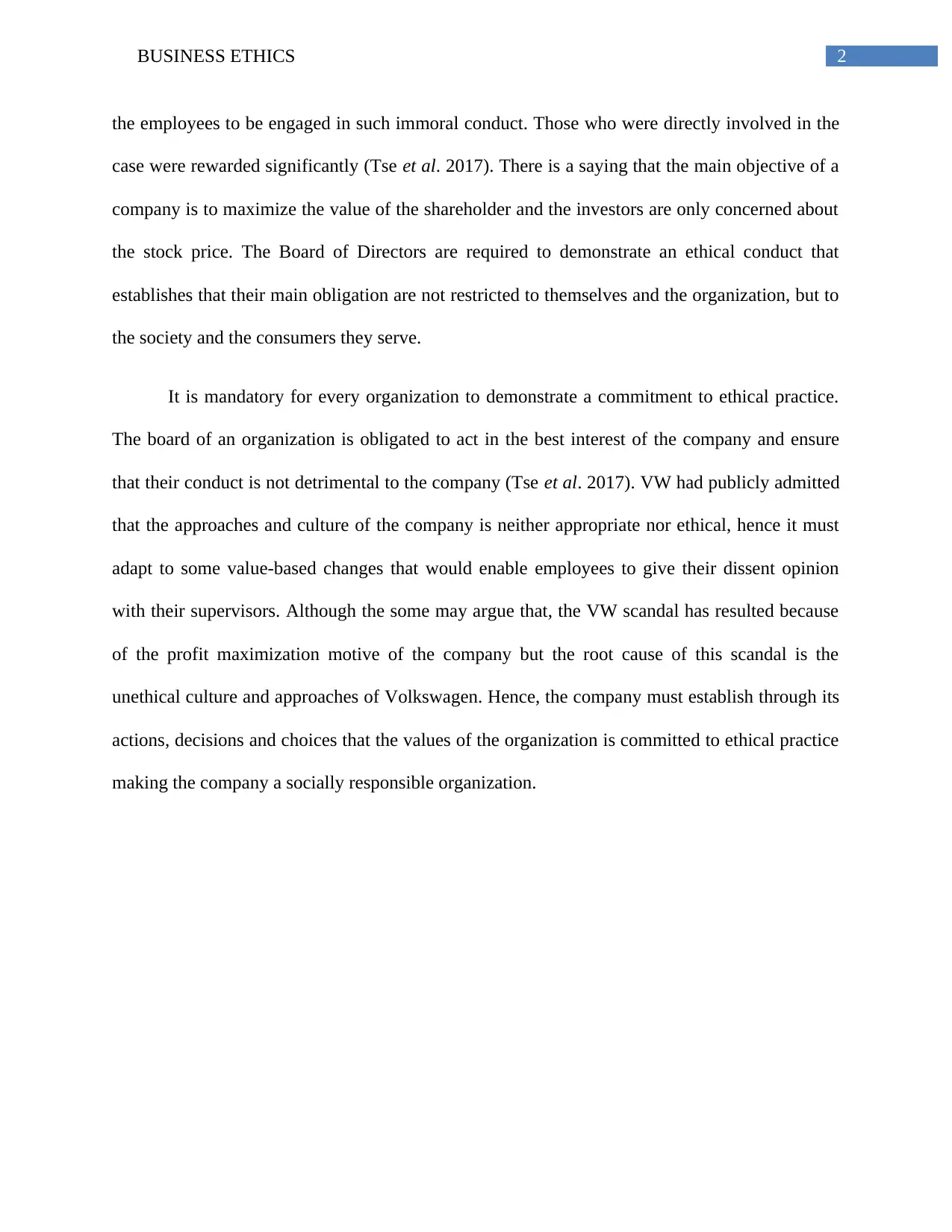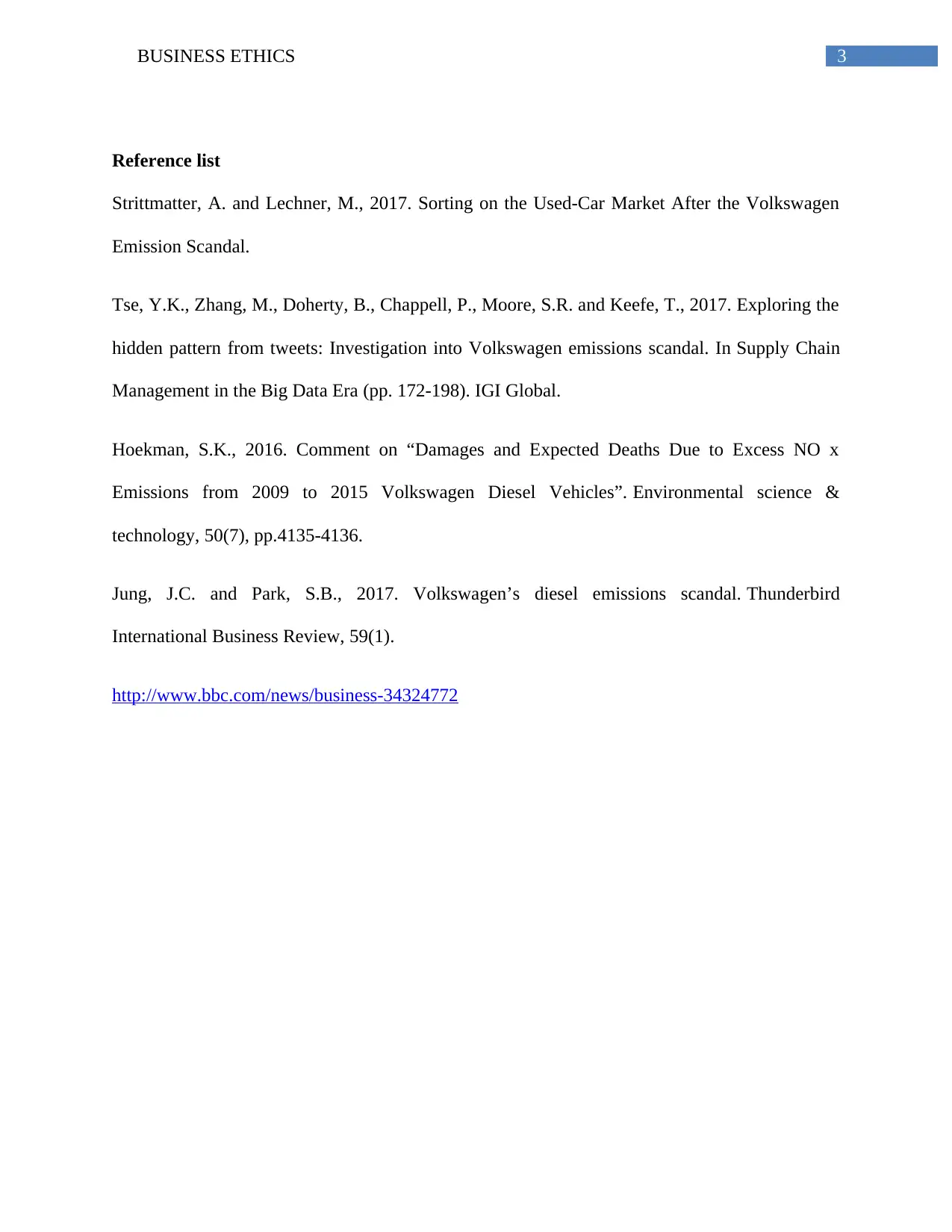Business Ethics: Volkswagen Diesel Scandal
VerifiedAdded on 2020/03/23
|4
|746
|64
Essay
AI Summary
The essay discusses the Volkswagen diesel emissions scandal, highlighting the unethical practices involved, the corporate culture that allowed such behavior, and the implications for business ethics. It emphasizes the need for organizations to commit to ethical practices and corporate responsibility, suggesting that the scandal stemmed from a culture prioritizing profit over ethical conduct.

Running head: BUSINESS ETHICS
Business Ethics
Name of the Students
Name of the University
Author Note
Business Ethics
Name of the Students
Name of the University
Author Note
Paraphrase This Document
Need a fresh take? Get an instant paraphrase of this document with our AI Paraphraser

1BUSINESS ETHICS
Volkswagen Diesel Scandal
The Environmental Protection Agency (EPA) found that several Volkswagen Cars had
installed software that was designed to cheat emission tests. The software known as ‘defeat
device’ was capable of detecting that a vehicle was being tested and when they were being
tested, the software would reduce the amount of nitrogen oxide emission. Such a conduct
amounts to an unethical as well as an extraordinarily deceitful conduct (Strittmatter and Lechner
2017).
A scandal of this magnitude indicates a systemic disrespect for the conduct at different
levels of organization (Jung and Park 2017). The scandal may have resulted from either one or
more of the following factors. Firstly, the organization have implemented behavioral norms
which would seem to be inappropriate for those outside the organization but the same would
appear to be acceptable for those working in the organization.
Secondly, the CEO of VW, Martin Winterkorn announced that a small group of software
engineers had embedded this device in the care and that he was completely unaware of this
conduct as it was not a corporate decision (Hoekman 2016). It is not sufficient for the main
actors or the leaders of the company to claim that they were not involved or did not have any
knowledge about such conduct, instead they should have questioned themselves that should they
have known about this conduct, the answer for which is definitely ‘yes’.
Thirdly, the centre of focus was on the fulfillment of the goals and targets of the company
at the cost of other priorities. Their commitment to attain their goals and meet the company
targets created an environment where the ends must justify the means, even if such means
involves immoral conduct. Fourthly, the incentives would have acted as an encouragement for
Volkswagen Diesel Scandal
The Environmental Protection Agency (EPA) found that several Volkswagen Cars had
installed software that was designed to cheat emission tests. The software known as ‘defeat
device’ was capable of detecting that a vehicle was being tested and when they were being
tested, the software would reduce the amount of nitrogen oxide emission. Such a conduct
amounts to an unethical as well as an extraordinarily deceitful conduct (Strittmatter and Lechner
2017).
A scandal of this magnitude indicates a systemic disrespect for the conduct at different
levels of organization (Jung and Park 2017). The scandal may have resulted from either one or
more of the following factors. Firstly, the organization have implemented behavioral norms
which would seem to be inappropriate for those outside the organization but the same would
appear to be acceptable for those working in the organization.
Secondly, the CEO of VW, Martin Winterkorn announced that a small group of software
engineers had embedded this device in the care and that he was completely unaware of this
conduct as it was not a corporate decision (Hoekman 2016). It is not sufficient for the main
actors or the leaders of the company to claim that they were not involved or did not have any
knowledge about such conduct, instead they should have questioned themselves that should they
have known about this conduct, the answer for which is definitely ‘yes’.
Thirdly, the centre of focus was on the fulfillment of the goals and targets of the company
at the cost of other priorities. Their commitment to attain their goals and meet the company
targets created an environment where the ends must justify the means, even if such means
involves immoral conduct. Fourthly, the incentives would have acted as an encouragement for

2BUSINESS ETHICS
the employees to be engaged in such immoral conduct. Those who were directly involved in the
case were rewarded significantly (Tse et al. 2017). There is a saying that the main objective of a
company is to maximize the value of the shareholder and the investors are only concerned about
the stock price. The Board of Directors are required to demonstrate an ethical conduct that
establishes that their main obligation are not restricted to themselves and the organization, but to
the society and the consumers they serve.
It is mandatory for every organization to demonstrate a commitment to ethical practice.
The board of an organization is obligated to act in the best interest of the company and ensure
that their conduct is not detrimental to the company (Tse et al. 2017). VW had publicly admitted
that the approaches and culture of the company is neither appropriate nor ethical, hence it must
adapt to some value-based changes that would enable employees to give their dissent opinion
with their supervisors. Although the some may argue that, the VW scandal has resulted because
of the profit maximization motive of the company but the root cause of this scandal is the
unethical culture and approaches of Volkswagen. Hence, the company must establish through its
actions, decisions and choices that the values of the organization is committed to ethical practice
making the company a socially responsible organization.
the employees to be engaged in such immoral conduct. Those who were directly involved in the
case were rewarded significantly (Tse et al. 2017). There is a saying that the main objective of a
company is to maximize the value of the shareholder and the investors are only concerned about
the stock price. The Board of Directors are required to demonstrate an ethical conduct that
establishes that their main obligation are not restricted to themselves and the organization, but to
the society and the consumers they serve.
It is mandatory for every organization to demonstrate a commitment to ethical practice.
The board of an organization is obligated to act in the best interest of the company and ensure
that their conduct is not detrimental to the company (Tse et al. 2017). VW had publicly admitted
that the approaches and culture of the company is neither appropriate nor ethical, hence it must
adapt to some value-based changes that would enable employees to give their dissent opinion
with their supervisors. Although the some may argue that, the VW scandal has resulted because
of the profit maximization motive of the company but the root cause of this scandal is the
unethical culture and approaches of Volkswagen. Hence, the company must establish through its
actions, decisions and choices that the values of the organization is committed to ethical practice
making the company a socially responsible organization.
⊘ This is a preview!⊘
Do you want full access?
Subscribe today to unlock all pages.

Trusted by 1+ million students worldwide

3BUSINESS ETHICS
Reference list
Strittmatter, A. and Lechner, M., 2017. Sorting on the Used-Car Market After the Volkswagen
Emission Scandal.
Tse, Y.K., Zhang, M., Doherty, B., Chappell, P., Moore, S.R. and Keefe, T., 2017. Exploring the
hidden pattern from tweets: Investigation into Volkswagen emissions scandal. In Supply Chain
Management in the Big Data Era (pp. 172-198). IGI Global.
Hoekman, S.K., 2016. Comment on “Damages and Expected Deaths Due to Excess NO x
Emissions from 2009 to 2015 Volkswagen Diesel Vehicles”. Environmental science &
technology, 50(7), pp.4135-4136.
Jung, J.C. and Park, S.B., 2017. Volkswagen’s diesel emissions scandal. Thunderbird
International Business Review, 59(1).
http://www.bbc.com/news/business-34324772
Reference list
Strittmatter, A. and Lechner, M., 2017. Sorting on the Used-Car Market After the Volkswagen
Emission Scandal.
Tse, Y.K., Zhang, M., Doherty, B., Chappell, P., Moore, S.R. and Keefe, T., 2017. Exploring the
hidden pattern from tweets: Investigation into Volkswagen emissions scandal. In Supply Chain
Management in the Big Data Era (pp. 172-198). IGI Global.
Hoekman, S.K., 2016. Comment on “Damages and Expected Deaths Due to Excess NO x
Emissions from 2009 to 2015 Volkswagen Diesel Vehicles”. Environmental science &
technology, 50(7), pp.4135-4136.
Jung, J.C. and Park, S.B., 2017. Volkswagen’s diesel emissions scandal. Thunderbird
International Business Review, 59(1).
http://www.bbc.com/news/business-34324772
1 out of 4
Related Documents
Your All-in-One AI-Powered Toolkit for Academic Success.
+13062052269
info@desklib.com
Available 24*7 on WhatsApp / Email
![[object Object]](/_next/static/media/star-bottom.7253800d.svg)
Unlock your academic potential
Copyright © 2020–2026 A2Z Services. All Rights Reserved. Developed and managed by ZUCOL.



